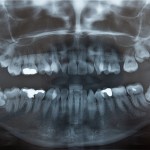
Worldwide it is estimated that 24% of third molars (wisdom teeth) fail to erupt or only partially erupt. Prophylactic removal was for many years considered to be appropriate care. However, removal of teeth which may remain disease free is costly although there are also concerns that later removal at an older age may cause more frequent and severe complications.
The aim of this Cochrane review update was to evaluate the effects of removal compared with retention (conservative management) of asymptomatic disease-free impacted wisdom teeth in adolescents and adults.
Methods
This review update followed standard Cochrane method with search strategy updated to the 19th May 2019.
Results
2 studies (1 RCT, 1 prospective cohort) were included.
The prospective cohort study reported on 416 males aged 24-84 comparing the absence (previous removal or agenesis) against the presence of asymptomatic disease-free impacted wisdom teeth on periodontitis and caries associated with the distal of the adjacent second molar during a follow-up period of three to over 25 years. Evidence (very low quality) suggests the presence of asymptomatic disease-free impacted wisdom teeth may be associated with increased risk of periodontitis affecting the adjacent second molar in the long term. This study, which is at serious risk of bias provides insufficient evidence to demonstrate a difference in caries risk associated with the presence or absence of impacted wisdom teeth.
The RCT which was at high risk of bias included 164 adolescent patients with 77 being analysed. The patients (55% female) had previously undergone orthodontic treatment and had ‘crowded’ wisdom teeth. The effect of extraction on dimensional changes in the dental arch after was compared with retention of asymptomatic disease-free impacted wisdom teeth. No evidence was found to suggest that removal of asymptomatic disease-free impacted wisdom teeth has a clinically significant effect on dimensional changes in the dental arch.
Neither study looked at secondary outcomes such as costs, or adverse events associated with retention (pericoronitis, root resorption, cyst formation, tumour formation, inflammation/ infection or removal (alveolar osteitis/postoperative infection, nerve injury, damage to adjacent teeth during surgery, bleeding, osteonecrosis related to medication/radiotherapy, inflammation/infection).
Conclusions
The authors concluded: –
Insufficient evidence is available to determine whether asymptomatic disease-free impacted wisdom teeth should be removed or retained. Although retention of asymptomatic disease-free impacted wisdom teeth may be associated with increased risk of periodontitis affecting adjacent second molars in the long term, the evidence is very low certainty. Well-designed RCTs investigating long-term and rare effects of retention and removal of asymptomatic disease-free impacted wisdom teeth, in a representative group of individuals, are unlikely to be feasible. In their continuing absence, high quality, long-term prospective cohort studies may provide valuable evidence in the future. Given the current lack of available evidence, patient values should be considered and clinical expertise used to guide shared decision- making with people who have asymptomatic disease-free impacted wisdom teeth. If the decision is made to retain these teeth, clinical assessment at regular intervals to prevent undesirable outcomes is advisable.
Comments
This Cochrane review is an update of a review published in 2012 and updated in 2016 (Dental Elf – 2nd Sep 2016). No new studies were included in the review so long-term well‐designed studies comparing removal or retention of asymptomatic disease‐free impacted wisdom teeth are urgently needed.
Links
Primary Paper
Ghaeminia H, Nienhuijs MEL, Toedtling V, Perry J, Tummers M, Hoppenreijs TJM, Van der Sanden WJM, Mettes TG. Surgical removal versus retention for the management of asymptomatic disease-free impacted wisdom teeth. Cochrane Database of Systematic Reviews 2020, Issue 5. Art. No.: CD003879. DOI: 10.1002/14651858.CD003879.pub5.
Other references
Dental Elf – 2nd Sep 2016
Third molars: insufficient evidence for removal of impacted asymptomatic disease-free teeth
